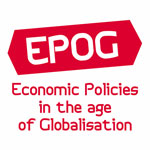 Issues and challenges raised by the financial, economic and social crisis, as well as the dynamics of rapid catch-up initiated by a number of major southern countries and by environmental issues, require a consistent rethinking of the basis of economic policies and imply an increasing need for well integrated economic expertise for the management of these policies.
Issues and challenges raised by the financial, economic and social crisis, as well as the dynamics of rapid catch-up initiated by a number of major southern countries and by environmental issues, require a consistent rethinking of the basis of economic policies and imply an increasing need for well integrated economic expertise for the management of these policies.
The main objective of the EPOG Master’s Course is to give birth to a new generation of international experts for public and private sectors, able to define and assess economic policies, and evolve within different political, social and regional contexts. It thus aims to provide not only an expertise in a specific field of economic policy (as usually done in existing Masters in economics) but also to enable students to get a global perspective on interdependencies and interactions between economic policies.
Most Master’s degrees in economics focus on very narrow fields or specific regions of the world. The added value specific to the EPOG Master’s course is its provision of the dual skill of expertise in a particular field and the ability to deal with the complex and systemic dimensions of economic policies, which to our knowledge is not provided by any other European Master’s course in economics. The EPOG Master’s will (i) provide students with in-depth skills to deal with different economic areas that generally require specialised training and (ii) include multidisciplinary contributions (law, sociology, geography and history, etc.) all of which are necessary for proficiency in economic policies in the context of current changes in the global economy.
EPOG programme is based on the specific institutional and holistic approaches of economic policies and achieved thanks to the collaboration and complementarities of eight prestigious universities, which offer excellent, recognised and well established Master’s courses:
- Université Paris 13 – Sorbonne Paris Cité (France)
- Università degli studi di Torino (Italy)
- Berlin School of Economics and Law (Germany)
- Kingston University (United Kingdom)
- University of Witwatersrand (Wits) (South Africa)
- University of Massachusetts – Amherst (USA)
- Seoul National University (South Korea)
- Universidade Federal do Rio de Janeiro (Brazil)
For further information, see the page dedicated to the Masters of IFRIS.